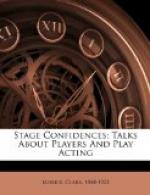But surely I have given instances enough in illustration of my original claim that the most dramatic scenes in plays are generally the mere reflections of happenings in real life; while the recognition of such scenes often causes a serious interruption to the play, though goodness knows there are plenty of interruptions from other causes.
One that comes often to my mind occurred at Daly’s. He once tried to keep the theatre open in the summer-time—that was a failure. Two or three plays were tried, then he abandoned the scheme. But while “No Name” was on, Mr. Parks was cast for a part he was utterly unsuited for. He stamped and stammered out his indignation and objection, but he was not listened to, so on he went.
During the play he was found seated at a table; and he not answering a question put to him, his housekeeper knelt at his side, lifted his hand, and let it fall, heavily, then in awed tones exclaimed, “He is dead!”
Now there is no use denying that, clever actor as he was, he was very, very bad in that part; and on the third night, when the housekeeper let his hand fall and said, “He is dead!” in clear and hearty response from the gallery came the surprising words, “Thank God!”
The laughter that followed was not only long-continued, but it broke out again and again. As one young woman earnestly remarked next day: “You see he so perfectly expressed all our feelings. We were all as thankful as the man in the gallery, but we didn’t like to say so.”
Parks, however, was equal to the occasion. He gravely suggested that Mr. Daly would do well to engage that chap, as he was the only person who had made a hit in the play.
Parks was, by the way, very droll in his remarks about theatrical matters. One day Mr. Daly concluded he would “cut” one of the acts we were rehearsing, and it happened that Parks’s part, which was already short, suffered severely. He, of course, said nothing, but a little later he introduced a bit of business which was very funny, but really did not suit the scene. Mr. Daly noticed it, and promptly cut that out too. Then was Parks wroth indeed.
After rehearsal, he and Mr. Lewis were walking silently homeward, when they came upon an Italian street musician. The man ground at his movable piano, the wife held the tambourine, while his leggy little daughter danced with surprising grace on the stone walk. As she trotted about gathering her harvest of pennies, Parks put his hand on her shoulder and said solemnly:—
“You ought to be devilish glad you’re not in Daly’s company; he’d cut that dance out if you were.”
One evening in New Orleans, when we were playing “Camille,” a coloured girl, who had served me as dressing-maid, came to see me, and I gave her a “pass,” that she might see from the “front” the play she had so often dressed me for. She went to the gallery and found herself next to a young black man, who had brought his sweetheart to see her first play.




